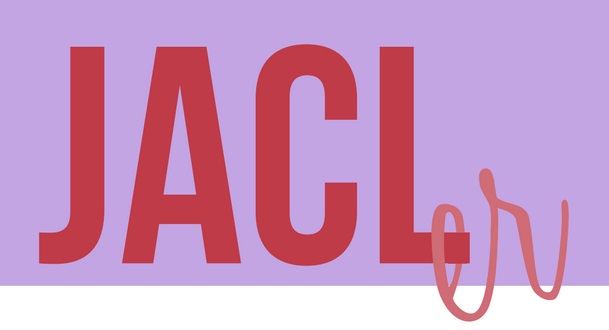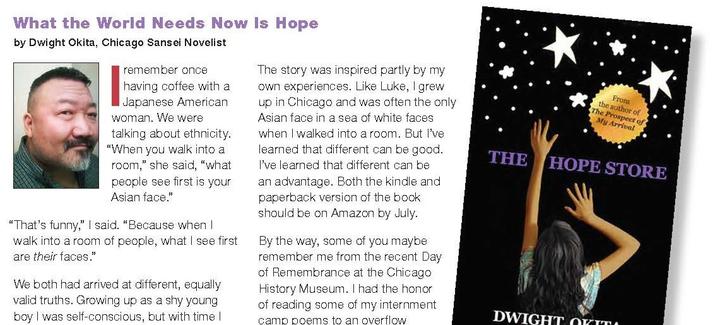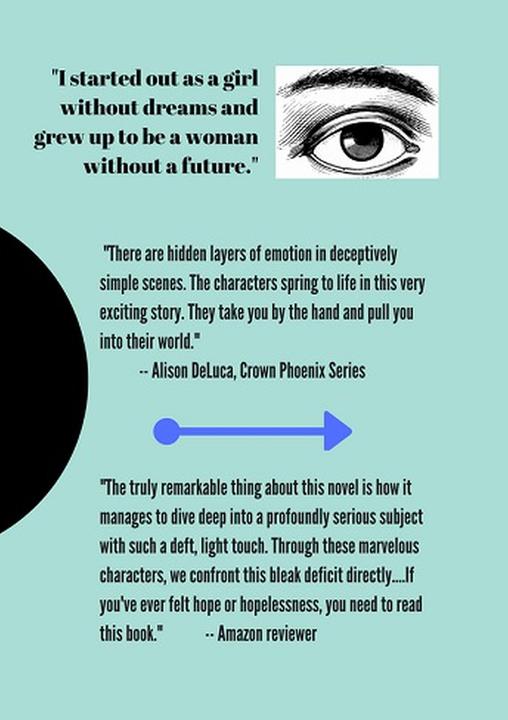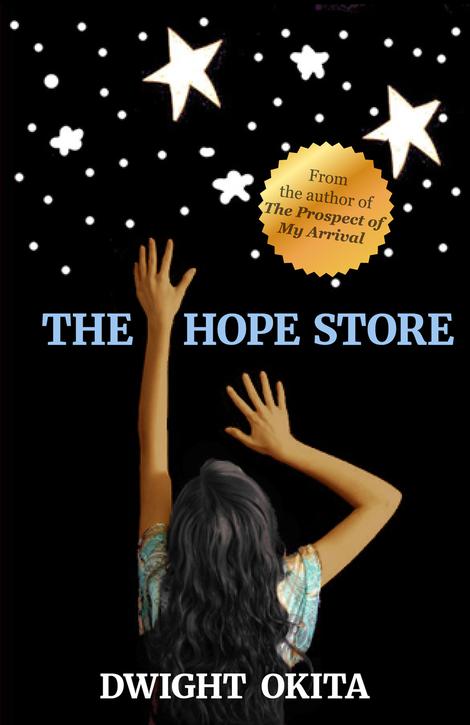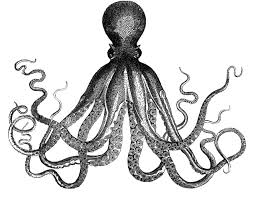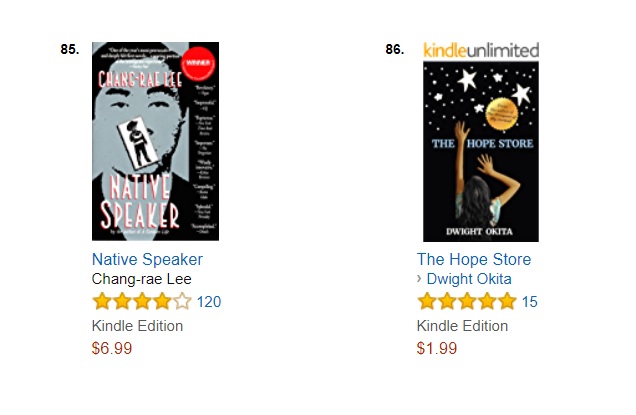DWIGHT OKITA
Words can fly.
This blog has over 10,000 followers.
Dwight wrote a piece about his book for Chicago's Japanese American Citizens League newsletter. [Click here to read the full article. It's on page 9 of the newsletter.]
October 11, 2017
The Hope Store by Dwight Okita: #BookReview
by Alison DeLuca
The Hope Store is another wonderful title from Dwight Okita. He's the author of The Prospect of My Arrival, one of my favorite soft-science fiction novels. Hope Store also showcases the spare, poetic prose I've come to expect from this author. Dwight is a poet and artist as well as a novelist, and these artistic sensibilities show in his books.
With touches of fantasy and whimsy, Hope Store follows Jada Upshaw, a woman who has 'desina sperara': a condition that makes her hopeless and has driven her to consider suicide. Jada is literally 'hope-impaired.'
In order to help people like Jada, Luke Nagano and his husband, Kazu, have just opened a store to install hope. Their motto is, "We don't just instill hope - we install it." This isn't as esoteric as it sounds: Okita has carefully created his own little universe in near-future Chicago.
All the best stories pose What If questions. In this case, Hope becomes something you can buy.
The Hope Store's logic sells the idea. Even as Luke and Kazu open their new business, they are mobbed by protestors who rename it The Hype Store. At the same time, Jada becomes the face of their campaign as a suicidal woman who has a new life.
Of course, everything comes with a price. Jada is thrust into celebrity status even as her happiness grows and intimacy with her boyfriend deepens. At the same time, Blair Matters, an expose reporter approaches her to research The Hope Store from the inside.
All of these plot arcs are handled expertly by Okita. The point of view switches from Jada to Luke, made clear by chapter headings and is very easy to follow. The writing is crystalline. However, there are hidden layers of emotion in deceptively simple scenes. I can see why there has been such a long wait between the author's titles: Hope, like Prospect, has been crafted into a masterpiece.
Okita adds nuanced layers by confronting modern issues as he tells his story. Hope Store, while on the surface a book about a woman without hope, also confronts the nature of news and Big Pharma. Is creating news-for-news-sake ethical? And when do newscasters become news themselves?
And do modern medicines promise incredible results at the risk of life-changing effects?
I mentioned earlier that Okita is an artist. His book is filled with tiny touches: little stars, beautiful chapter headings - that add to the reader's enjoyment. Reading an Okita book is an experience.
Finally, the characters themselves spring to life in the very exciting story. Jada, Luke, Kazu, and even Blair Mathers (the journalist) are living, breathing people. They take you by the hand and pull you into their tiny, hopeful world.
Alison Deluca is the author of several steampunk and urban fantasy books. She was born in Arizona and has also lived in Pennsylvania, Illinois, Mexico, Ireland, and Spain. Currently she wrestles words and laundry in New Jersey. Connect with Alison on Facebook, Twitter, Google+, Pinterest, and her blog.
Best in Fantasy
The Book Report... celebrating the great reads from old favorites to the best hot new writers. I mostly read fantasy, but let's face it. I love to read every genre and I only review what I love!
Thursday, October 26, 2017
The Hope Store, by Dwight Okita @dwightokita
A poet and playwright, Dwight Okita’s debut novel, The Prospect of My Arrival, a finalist in the Amazon Breakthrough Novel Awards, was one of the more absorbing sci fi novels I’ve ever read. So, I was quite intrigued when I saw he had a new novel out, The Hope Store.
THE BLURB:
Two Asian American men, Luke and Kazu, discover a bold new procedure to import hope into the hopeless. They vow to open the world's first Hope Store. Their slogan: "We don't just instill hope. We install it." The media descend. Customer Jada Upshaw arrives at the store with a hidden agenda, but what happens next no one could have predicted. Meanwhile an activist group called The Natural Hopers emerges warning that hope installations are a risky, Frankenstein-like procedure and vow to shut down the store. Luke comes to care about Jada, and marvels at her Super-Responder status. But in dreams begin responsibilities, and unimaginable nightmares follow. If science can't save Jada, can she save herself -- or will she wind up as collateral damage?
REVIEW:
Okita’s cerebral yet poetic prose is gentle and approachable, even when depicting the harsher realities of his worlds. Set in a Chicago of the future, the story opens with Jada Upshaw, an amazing, multidimensional character. A well-educated woman, Jada is, at the outset, intent on killing herself. Her despair and confused emotional state is laid bare, but shown with the delicacy and respect Okita brings to all his characters.
Luke Nagano describes himself as “a boy with a big heart but no idea where to put it.” This holds true through the entire novel, as Luke himself is the embodiment of hope. Of Japanese descent, Luke is a native of Chicago, and is deeply rooted in Midwestern American culture. He is deeply in love with Kazu Mori, a rock-star scientist from Tsukuba, Japan. Luke’s thoroughly American blundering through life causes him to make occasional missteps, inadvertent cross-cultural clashes which create tension. Kazu is forgiving, but is completely dedicated to his work. Their love/work relationship drives the plot, also creating tension.
The relationships and thoughts of both Jada and Luke are shown throughout the narrative, but Luke and Jada still have secrets from the reader, keeping me turning the pages.
Okita shows the actual science behind the Hope installation with masterful strokes. Instead of devolving into a drawn-out explanation that most readers would skip, he offers just enough information about the key elements, a framework for the reader to hang their imagination on.
Beyond the great characters and the futuristic setting is the deeper story. Hope, the lack of it, the desire for it, and the lengths we will go to acquire it is what drives this tale. Intrigues, private agendas, and in some cases, desperation drive the story to a satisfying, logical, yet still surprising, finish.
I highly recommend The Hope Store. I found it cerebral, sexy, and thought-provoking, as all Okita’s work is.
Posted by Connie J Jasperson at 7:52 AM
HOPE STORE.
Reviews/Press/More.
In my new novel THE HOPE STORE, I thought it would be fun to tell the story from two different points of view: one hopeful and one hopeless.
Marketing Tools
PUBLISHERS WEEKLY
I took out an ad/listing in Publishers Weekly, the Booklife section for indie books. The mag is read by bookstore owners, librarians, agents, etc. Looks cool in the magazine. (SEE LEFT)
BEST INDIE BOOK CONTEST
I entered BIB and didn't win. But I will be named an Author To Watch on the
contest website!
SOCIAL MEDIA
I wrote a short piece on Medium.com. And took to Twitter and Facebook.
PUBLICITY
I'm awaiting a review from Windy City Times, Chicago's LGBT newspaper end on November. Also I sent 20 press releases, with little response. But I did get a reply from the Times Literary Supplement which is in London. They said they'd forward my info on to reviewer for consideration!
Would like to have readers across the pond.
GIVEAWAY
I did a Goodreads Giveaway where 750 entered to win
a copy of Hope Store.
Imagine if hope was a tangible thing, a commodity to be bought and sold. Local author Dwight Okita imagines a slightly altered reality where a Hope Store—part medical clinic, part relaxation studio—is open in Andersonville.
His story is told from the perspectives of Jada, a woman literally born without hope, and Luke, the partner of the visionary scientist Kazu who came up with the Hope Installation.
As a person hopeless to the point of suicide, Jada wants to rain on the hope-store parade. She comes up with the idea to contract a freelance journalist to write an expose of the Hope Store; after all, surely it's a scam. But unexpected things happen when Jada gets her first dose of hope. Meanwhile, Luke struggles with the pressure of helping the business get off the ground: securing coverage from CNN, dealing with a pesky bunch of protesters who believe hope should be natural, appeasing his worried investors, and navigating his relationship with his business and romantic partner. Luke is keeping a secret from Kazu: he's not as responsive to the Hope Treatment as he pretended to be when they met in the clinical trial. It's a secret that undermines the very foundation of their relationship, let alone the scientific integrity of the business.
The Hope Store is a deceptively simple, engrossing read. Okita's research to create a believable therapeutic process is quite commendable and thought-provoking.
He also primarily operates inside his character's heads, which creates some interesting dynamics as Luke and Jada observe each other without any idea of what the reader already knows. Okita's writing is easy and conversational, despite the darkest moments. Be warned of attempted suicide—although that is in fact one of the most vivid scenes of The Hope Store and is done in a genuine, thoughtful manner.
Overall, The Hope Store is a worthy thought experiment and a tale decently told. Okita clearly has a love for science and magical realism and mixes that with an uncommon amount of empathy and interspersonal dynamics. You will want to know how everyone ultimately copes with the sudden infusion of hope in their lives ... and might perhaps find yourself wishing said store was a place you could go.
Reviewed by
Liz Baudler
The Kindle is doing well with other Asian American novels.
Also doing well in
LGBT sci-fi.
VIDEO FROM MY BOOK LAUNCH
Click below to see some great video footage of the reading. Video by Liz Martinez. My Book Launch Party for my new, speculative novel THE HOPE STORE was a smash, hosted by Women & Children First bookstore. I read short excerpts from the novel with piano music as underscoring. Here is some of the Q&A. https://youtu.be/GLQ9hwzcvPg
Click above for an in-depth interview with Dwight.

